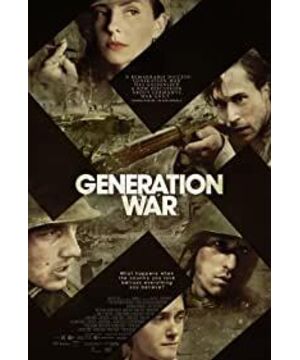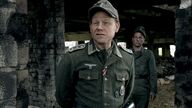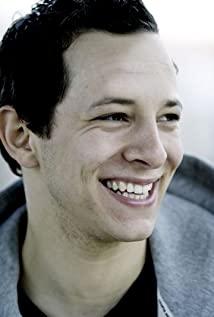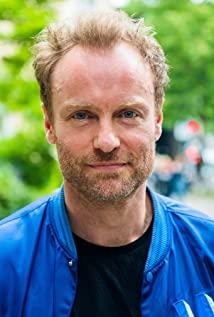In May of this year, I accidentally downloaded a good film, "Our Fathers," from "Everyone Film and Television", a rare WWII-themed TV mini-drama filmed by Germans, with three episodes of 90 minutes each. The story describes what happened to five young Germans from 1941 to 1945, when the Soviet-German war began. The five young people are two Wehrmacht (the older brother is a lieutenant and the younger brother is a soldier), a field nurse, a Jew, and a German country singer. Two of the five best friends are lovers, a Wehrmacht lieutenant and a field nurse, a Jew and a singer. Before the brothers went to the battlefield, the five friends were still happily partying. Most people optimistically believed that the war would end by Christmas at the latest. Only the melancholy younger brother predicted pessimistically: war will bring out the worst in us. Sure enough, the war held everyone hostage, and everyone was wrapped up in the torrent of the times, Shen Lun.
I've always thought that the themes of all war movies are only moral if they are anti-war. (The most hated scene is when the little soldier said to the leader in a coquettish tone, "Master, when will you be able to go to the battlefield? The leader smiled and stroked the soldier's head, anxious? Don't worry, you have to fight!) The war scenes in "Our Fathers" are brutal and bloody. The rolling wheels of war are like a big meat grinder. Wherever it goes, corpses are scattered everywhere, leaving only black flies buzzing and revelling in the hastily buried ground that is still gurgling with blood. The battlefield is the slaughterhouse, and every flesh and blood is a lamb to be slaughtered. Every young life passed away so meaninglessly, whether it was a German peasant who wanted to have a piece of land in Russia's vast land to marry and have children, or a 65 who wanted to go to a German university to study Philosophy before the summer semester started. The old German mother's child is born. The war has destroyed all warmth, deprived people of dignity, reason, and belief, and the bottom line of being a human has dropped again and again. The war is even more devastating for the people of the invaded country. There are many killing scenes in the film, which are not sensational but make people sweat. The captured Soviet officers, Jewish girls, and those who were chosen to kill in revenge for the Polish guerrillas set an example. The Polish boys...were all shot dead, and the most shocking thing is that before death, everyone, whether it was Soviet officers, Polish partisans, or even Jewish girls and Polish boys, trembled but not a single one begged for mercy. There is no doubt that everyone has witnessed so many deaths that once it is their turn, there is no illusion of escape.
It is impossible for any excellent film and television work to be without full-fledged characters. Although the five protagonists in the play have different personalities, they are at least enthusiastic, kind, and carry their own dreams. However, in the frenzy of war, the fate of individuals is not in their own hands at all. In their struggle to survive, whether they die or survive by chance, all people have changed beyond recognition. Among them, the character development and final fate of the two brothers are especially embarrassing.
Brother Wilhelm is a narrator to tell the fate of five people in the play. He is a typical German, handsome, neat, rigorous, restrained and responsible. He is the German Wehrmacht, not the Gestapo, so he hopes that war is war, not to kill innocent people indiscriminately, he has his own bottom line as a soldier. When the soldiers under his command passed away in the blink of an eye, the cruel and absurd reality completely awakened him. He became a deserter and spent a day fishing and cooking in the Ukrainian countryside. After being caught, he narrowly escaped the death penalty. Into a suspended sentence (it is estimated that the casualties of the German army are too great, so the living force can no longer be lost casually), he lived tenaciously, endured the torture of his perverted boss, and did his best to save the innocent (with a gasoline barrel, he burned ordinary Ukrainian farmhouses as ordered) , seeing the kind old couple finally couldn't bear to start, and would rather bear the consequences of disobedience). And because his essence is powerful, the boss always wanted to insult him, but he couldn't do it. In the end, when the boss wanted to harm him, he was killed by Wilhelm, who had been on guard, and fled again.
The younger brother, Friedhelm, is a contradictory character. Friedhelm was a bookworm, and he kept books in his bag when he enlisted. Brother said: War makes men grow up. But he said: War will bring out the worst of us. Among the "gangsters" who were brainwashed by the totalitarian propaganda machine, he was the only one who was acutely aware of the nature of war from the very beginning and was therefore rejected or even "beaten". Maintaining the purity and compassion of human nature, after his brother was ordered to be shot and killed by the Soviet officer, his eyes were cast to his brother's silent condemnation, and when he witnessed the Ukrainian Jewish girl being shot by the Gestapo, his pain was inexhaustible, this is a complete madness. world.
At the same time, he is cowardly and childish, his strict father looks down on his kindness and skepticism, and his mother prefers the younger son to parting and tells the older son to let the younger brother come back alive, plus there is such a "mainstream" above. Excellent brother, such a small family ecology is doomed to the initial character of the younger brother. He went to the battlefield reluctantly, but it was impossible to be alone. He was cynical about war, so he deliberately took a puff on enemy planes during night reconnaissance to attract bombardment from enemy planes. (I think in his heart, this is someone else's war, nothing to do with him.)
My brother is a bit right, war makes men grow up. Although this "growth" refers to the eradication of conscience, in order to preserve one's life, he will do anything. The comrades around him fell one by one, and Friedhelm's soft heart was a little dull. He's a smart guy, and as soon as he understands that the war is either you or I, he instantly turns into a survivalist. In the swamps of the Soviet Union, Friedhelm first suggested using Russian peasants to clear mines (at this time, the older brother looked at his younger brother in amazement), and "war will bring out the worst of us" became his own prophecy. He really participated in the war and became an excellent German soldier, and he lost his heart bit by bit. Death has begun and death has followed closely because your heart has been wiped out and your mind has been wiped out, so do you still exist?
But this is a young life with exuberant vitality. Even if the mind is withered, the body still instinctively wants to live. Even though he saw his brother being killed (actually not dead), he rushed into the Soviet telegraph station frantically, but at this moment he wanted to survive, so when the Soviet army made a comeback, he put on the clothes of the dead Soviet army, relying on the will The superiority of the Russian language escaped, only to be nearly killed by his own guns.
Seriously injured Friedhelm returned to Germany, his father sneered at him, his mother wept with joy, and the ignorant teenager in the street coffee shop envied him for his military merits. After his injury he left his crying mother and decided to go back to the front. He was determined to fight for Germany. When the building is about to fall, live to death. The younger brother who returned to the battlefield was cold and cruel, like a walking corpse. He killed teenagers without mercy, hanged people who were retaliated by the partisans, and treated the German executioner of the SS with indifference but carried out every order he ordered. There was no life in his eyes, no fun, no pain, and he had completely transformed himself into the most hateful German Nazi. The only thing that can see the little bit of human power is to kill the SS and let go of his friend Victor, the Jew. The complexity of human nature in this film is unforgettable.
His death is obviously in his own plan (because of his good nature, because of the confrontation between good and evil in his heart, it is impossible for him to forgive himself for such evil. Therefore, the Nazis, who were full of evil, turned into a government after the war. staff), the war was about to end, he warned the 12-year-old German Boy Scouts to surrender to the Soviet Army not to die, and wrote a last note to his friends on the group photo of five friends, asking the old man to pass it on (very realistic, at the final stage of the war, The experienced, prime-age German soldiers were almost dead, and the old man and the child also went to the battlefield), rushed into the gun forest like suicide, and was shot to death. On the verge of death, his eyes finally returned to the clear and innocent look in his youth.
My brother's life is a tragedy, and because of its original beauty, this tragedy is even more heartbreaking. Of course, there were profound social reasons for this tragedy. At that time, all Germans still had a fresh memory of the fate of Germany as a defeated country after the First World War. Therefore, many German intellectuals, knowing that defeat was inevitable in 1943, took the initiative to sign up for the war. This was the general background of the society at that time, and it would be incomprehensible without the psychological transition of the characters in this background. But why can't the younger brother achieve self-redemption like the older brother? The same background but there are still individual choices. The younger brother is the same as the older brother with independent thinking ability, and even he sees through the truth earlier than the older brother. But the younger brother does not have the maturity and tenacity of the older brother, so he cannot always protect his bottom line and his heart. The war has released all the evil in his heart, and this evil is also the evil in the hearts of most German people who should be kind, upright, diligent and speculative in normal times!
Overall, "Our Fathers" treats that history with sincerity. The film begins with the Soviet-Russian war as a starting point, which is already remarkable. Because as we all know, the recognized starting point of World War II in the European battlefield started with the joint invasion of Poland by the Soviet Union and Germany, and the two countries jointly divided Poland. It did not even focus on describing the burning, killing and looting of the Soviet Red Army when it counterattacked the German mainland, and the gang rape of women in Germany, including Eastern Europe. Personally, I think it is more representative that my brother was captured in the Soviet "Gulag" (labor camp) at the end of the war, worked hard in the ice and snow of Siberia, and finally returned to Germany after more than ten years. But apparently the German producers have to be a little more restrained. (Of course, I don’t think it was wrong for the Soviet Union to send war criminals to labor camps. The Americans also established the notorious Rhine camp. Since they have done evil, they must be punished before they dare to do it again! Repaying grievances with virtue will only make The invaders thought they were not wrong. The Chinese understand this better than anyone else.) The anti-Semitism of the entire Eastern European people and the guerrilla warfare of the Poles in the film led to the SS retaliation. Some people may think that the Germans are serving I defend myself, but I think this is indeed a historical fact, the original state of war. In the description of Jews and Poles, the producers should have taken some thought. The images of German Jews (Viktor, one of the five friends) and Polish Jews (Doctor Lilya) in the film are smart, brave, tolerant and rational. , the Polish girl who escaped with Viktor from the train transporting the Jews to the concentration camps, is also portrayed as strong, decisive, and witty. I think it fully embodies the Germans' atonement for the invaded and insulted.
To record history from the perspective of a defeated country, to expose the scars, and to make a big surgical move, to show the future generations the great crimes that our nation has committed to the world, so as to educate future generations and never commit them again. In this sense, the Germans are really respectable.
How I hope that in my lifetime, I can also see our own epic film and television works, whether it is about the Anti-Japanese War, or about the great famine and the Cultural Revolution.
The past is not as good as smoke!
View more about Generation War reviews











